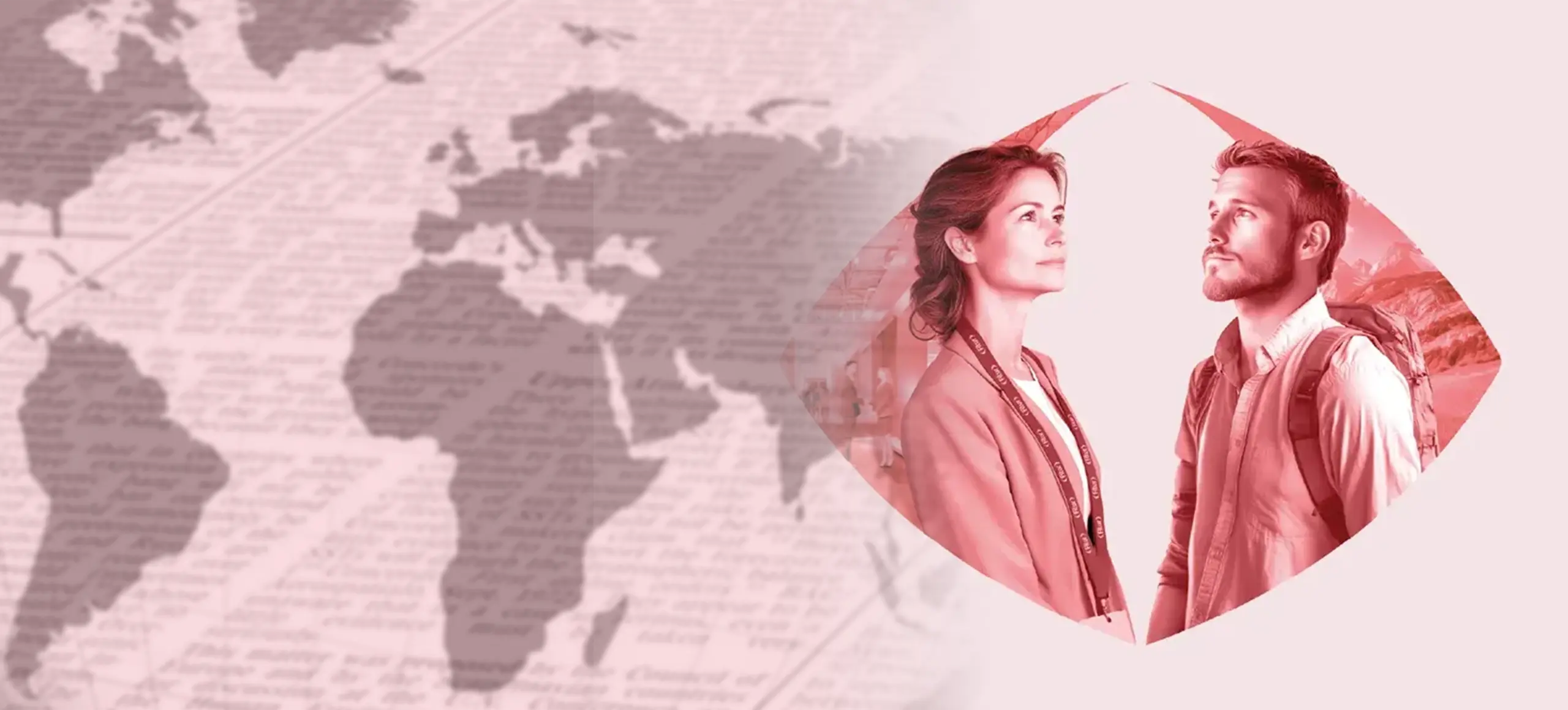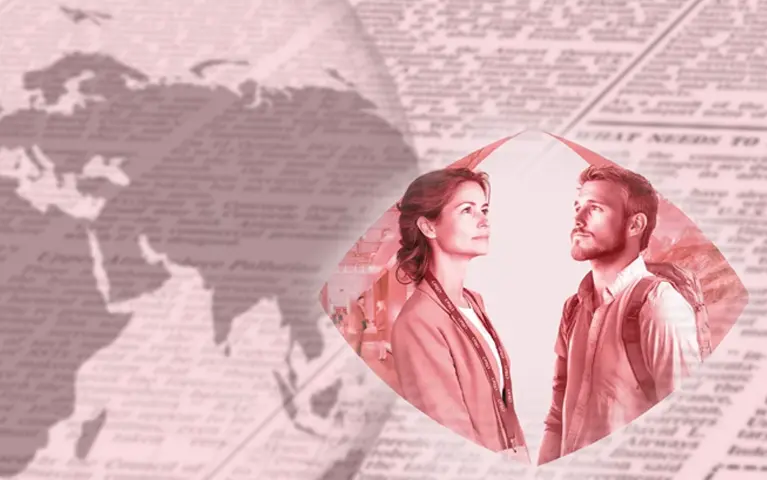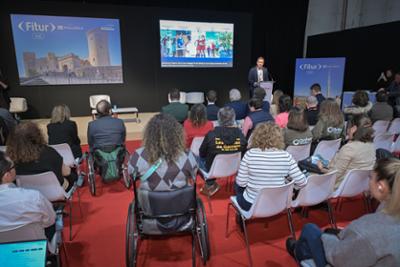

FITUR 4ALL Shares Insights to Promote More Accessible and Diverse Tourism
The section emphasizes the need for public-private collaboration to promote an inclusive tourism model.
FITUR, in collaboration with IMPULSA IGUALDAD and supported by MALLORCA, has launched the second edition of FITUR 4ALL as part of the International Tourism Fair held at IFEMA MADRID. With the goal of raising awareness and promoting accessible tourism tailored to the needs of all travelers, the section featured experts sharing their experiences, presented the 2nd FITUR 4ALL Awards, and unveiled the Guide to Best Practices in Tourism Accessibility by FITUR 4ALL.
Francisco Sardón, president of IMPULSA IGUALDAD, opened the event by underscoring the importance of applying accessibility criteria to tourist destinations to advance social justice, sustainability, and equal opportunities. Meanwhile, María Valcarce, director of FITUR, highlighted the section’s establishment as a key initiative within the fair: “We are very proud to have created, alongside IMPULSA IGUALDAD, this essential space. FITUR 4ALL motivates us to remain ambitious in promoting accessible tourism as both a right and an opportunity.”
Also present at the event were Llorenç Galmés, president of the Consell de Mallorca, and Miquel Roca, from the Consell de Mallorca’s Sports Department. They reaffirmed their region’s commitment to accessibility and introduced initiatives aimed at decentralizing tourism and attracting diverse groups. “Our goal is to move towards inclusive and responsible tourism where everyone can enjoy the experience of visiting our land,” explained Galmés.
Winners of the 2nd FITUR 4ALL Awards
The initiatives from Valladolid, Peru, iUrban, and the Greenways Program of the Spanish Railways Foundation were recognized with the 2nd FITUR 4ALL Awards in the categories of Inclusive National Destination, International Destination, Inclusive Company, and Inclusive Organization, respectively. Valladolid was praised for integrating accessibility across all its tourist spaces, including festivals and cultural events, as well as its AI assistant, which facilitates accessible experiences. Peru was honored for its accessibility guide, TUR4all methodology, and a sustainable approach that incorporates accessibility into its main destinations. iUrban stood out for its personalized multilingual AI capable of planning trips with more than 500 accessibility criteria, revolutionizing inclusive tourism. Finally, Vías Verdes was recognized for transforming former railway areas into accessible tourist routes, successfully adapting rural and natural environments.
The trophy presented to the winners was handcrafted by Cirvite, reflecting FITUR 4ALL's inclusive commitment, along with a certificate and a distinctive seal for use in their communications.
Guide to Best Practices in Tourism Accessibility by FITUR 4ALL
On January 23, FITUR 4ALL presented the Guide to Best Practices in Tourism Accessibility, showcasing accessible initiatives from 2024 and 2025. These were selected for their positive impact, potential, and replicability, aiming to make tourism accessible to all. They promote a more inclusive sector that recognizes the diversity of travelers while offering an updated perspective on the latest trends and best practices in accessibility.
Round Tables Addressing Accessibility in Tourism
The event began with the panel “Spain as a Leading Destination in Accessible Tourism,” where experts agreed that accessibility is vital for global competitiveness. Jaime Alejandre of the OET in Tokyo, stated that “Accessibility is not a favor or charity. The lack of accessibility is discrimination,” stressing the importance of creating international standards and public-private partnerships. Manuel Butler, director of the OET in London, noted that the British market particularly values accessibility, while Isabel Martín, director of the OET in Canada, highlighted the need for Spain to improve its positioning in markets like Canada and the U.S.: “Hospitality, a hallmark of Spain, is strengthened when accessibility and sustainability are integrated.” The discussion.was moderated by Enrique Ruiz, Turespaña’s deputy director of marketing.
The second panel on social sustainability, moderated by Isabel Novoa, president of the International Social Tourism Organization, featured Igor Stefanovich, technical coordinator of the UNWTO’s Ethics, Culture, and Social Responsibility Department. He discussed tools developed for inclusive agencies, cultural tourism, and natural routes aimed at improving travel experiences for everyone. Karina Fortete, tourism planning and management advisor for Montevideo, emphasized that “local sustainability requires a global vision—accessibility is an obligation.” Ana María Zambrano from Colombia's MINICT shared data on Latin America, noting: “We’re not talking about a minority. In our region alone, 85 million people with disabilities want to travel, and that number grows when we include older adults. Accessible tourism is not optional—it’s urgent.” Virginia Puchades of Visit Benidorm detailed the advances that have made the city a certified inclusive destination.
The third panel, moderated by Marina Gil of IMPULSA IGUALDAD, explored how data and AI are transforming the sector. Dolores Ordoñez of AnySolution and Enrique Martínez of SEGITTUR emphasized the need to standardize accessibility data and align it with clear objectives to meet travelers’ real needs. “A uniform model enables the combination of information to generate useful and efficient services.” Jesús de Béjar from iUrban highlighted AI's impact in projects like Valladolid’s tourism assistant, while Daniel Martínez, director of Visit Gijón, remarked that “technology is key, but the real challenge is improving users’ everyday lives.”
Another session, “Air Transport and Inclusion,” addressed how transportation facilitates accessible tourism. Participants stressed the importance of making aviation and its infrastructure accessible to ensure everyone’s right to travel freely.
Finally, the session “Travel Distributors: Key Players in Accessible Tourism” revealed data showing that over 1.3 billion people require special mobility support, presenting a significant business opportunity for companies to invest in solutions for inclusive tourism.
The closing panel featured leaders from public administrations, including Tono Franco, director of the Visit Valencia Foundation; Israel Martínez, director general of Tourism for the Valencian Community; Blanca Jiménez, Valladolid’s tourism and events councilor; and Francisco Sardón, president of IMPULSA IGUALDAD. Each shared the investments, plans, and actions their cities have undertaken to meet modern accessibility demands and ensure they can successfully welcome all types of tourists.





